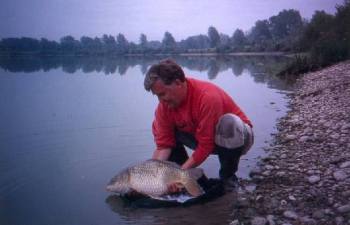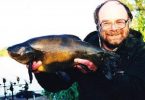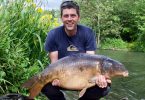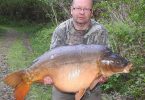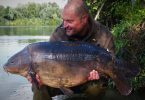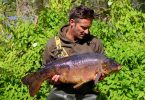Some years ago, when I lived just outside Reading, I spent quite a lot of my fishing time on Burghfield Pits. One late afternoon, as I was tackling-up for an evening session, the club bailiff asked to see my permit – which I showed to him. "I hope you don’t intend staying the night," he said, "night fishing’s not allowed."
"No,’ I replied, "just until dusk." Then I added, "Incidentally, why does the club ban night fishing?"
"Because we’re dead against it," he said.
"Why’s that?" I asked.
"Because it’s against club rules," he responded.
"Yes, I understand that – but why is it against club rules?"
"Because we’re dead against it."
And so the exchange continued..! The club was "dead against it" because it was against the rules, and against the rules because they were "dead against it"!

But, ban-mentality and prejudice apart, what rules might apply to a fishery?
They fall into three distinct categories. First there are those which are imposed by statute – a close season on rivers, for example.

How much is too much?
The next group comprises those which might be, imposed by the landowner -they are likely to be concerned with bankside access, vehicular access, parking, closure dates, time restrictions etc. Any club or individual who leases a water has little choice but to give their assent because renewal will likely be conditional upon compliance.
The third category is made up of rules which the controlling club or syndicate leader might establish. Occasionally, it must be said, they include the bizarre and the downright daft! Hopefully, however, they will be sensible, and benefit the fishery, the fish and the members.
They must also be unambiguous and enforceable. This is important. How, for example, do you interpret a rule which says something like, "Anglers must not use an excessive amount of groundbait"? After all, what one angler may regard as excessive, might be seen as quite a modest quantity by someone else. Better to monitor the situation, and introduce a weight-limit if problems are seen to arise.
BAIT BANS
Sometimes specific baits are banned – trout pellets and nuts being the usual ones. Such bans tend to follow sensational "Shock! Horror!" stories in the angling press – stories which are almost always based on misinformation. No baits, in my opinion, are intrinsically dangerous, but problems can arise if they are grossly misused – especially in small, hard fished waters. As before, I think the situation is best dealt with by means of a monitoring policy – with restrictions being imposed if deemed necessary.
The same attitude can be applied to prebaiting. No harm is likely to arise from modest levels of prebaiting, so a blanket-ban is unnecessary – but if individuals or groups are seen to be going over-the-top, then curbs will have to be introduced.
NIGHT FISHING
A contentious issue on some waters is session fishing. It is not unusual for hardcore carp anglers to camp-out in a spot for a couple of weeks or more; and occasionally for months rather than weeks! This results in annoyance and indignation from members who, understandably, feel aggrieved that key swims are occupied almost permanently. It goes beyond mere selfishness, though – there are issues of bankside wear, litter and sanitation to consider.
I have no wish to prevent anglers from night fishing, but its excesses should be kept in check. The simplest way of achieving this is to confine night fishing to designated nights – say, Mondays, Wednesdays and Fridays – thereby ensuring that anyone who arrives early morning after a non-fishing night does not find their choice of swim restricted by bivvy-bound session men. This system solves at a stroke the problem of prime swims being "stitched up" for weeks on end. Yet another benefit is that it reduces pressure on the water and the fish.
Alternatively, standard membership could provide dawn to midnight access to the water, while a supplementary night permit would entitle the holder to fish beyond midnight for a designated number of nights. The actual number would depend on the size of the water and its popularity, but I think something in the order of 14 is reasonable. Each permit holder’s allocation could be taken as single nights, weekenders, or longer sessions such as an annual holiday. But when the 14 nights – or whatever – have all been used, there would be no more until the following year (or season). And as a guard against abuse of the facility, I suggest it be made clear that unused nights may not be transferred to another angler, nor carried over to the next year.
ROD LIMIT

In large, lightly fished waters, three rods are appropriate.
Earlier I mentioned angling pressure. This takes two forms: angler pressure and rod pressure. By statute, we are permitted to use four rods (providing they are all licensed). Few waters actually allow four rods to be used, but most allow three. There is no "magic number" which is correct in all situations because waters vary; for that matter, swims vary, too. On most waters, I think the maximum should be two – but there are undoubtedly some where three might be appropriate. A large, lightly fished water, for example, would not suffer from the use of three rods. In winter – when even relatively popular waters can be deserted for days at a time – a three rod facility might be introduced.
RETENTION
Most of us like to take ‘trophy" photos of our biggest fish. Unfortunately this often results in fish being retained for far too long, and sometimes in potentially dangerous circumstances (low dissolved oxygen, for example). If I controlled a fishery, I would have no hesitation in banning keepnets; they cause untold damage – especially to roach and bream. I would allow only perforated keepsacks, and restrict their use to single fish. Additionally, I would impose a 10 minute limit on the length of time a fish may be retained. "But it will
take longer than that to ‘phone someone to come and take photos for me…" Oh come on! Anglers who habitually fish alone, and who want a photo-record of their catches, should ensure they are equipped for the purpose – and that means having a camera with a remote self-take facility. Anyone who is not suitably equipped should return fish immediately – after all, what sort of angler places ego above fish welfare?

Jim netted this carp, unhooked it and returned it immediately.
DISEASE
Some fishery managers install disinfectant-dips, and insist that all nets be dipped before anglers commence fishing. On the face of it, this seems like a sensible precaution against the introduction of disease, but in practice it is a valueless, purely cosmetic exercise. To be effective, idophor disinfectants (the sort in common use), should be changed every week or so. This hardly ever happens. And it is misleading to call them "dips", anyway, because equipment which comes into contact with fish (not just landing nets, but also unhooking mats, weigh-slings and retainers) needs to be soaked for upwards of ten minutes. It is not going to happen, is it?
The most practical and effective way of killing pathogenic "nasties" is to ensure equipment is thoroughly dried between trips – best of all, nets etc. should be hung in sunlight because many bacteria and all viruses are destroyed by exposure to ultraviolet. This is one area, however, where fishery managers are compelled to rely on anglers acting responsibly because a rule such as, ‘All nets etc. must be dried before use," is impossible to enforce.
To the best of my knowledge, no incidence of fish disease has been reliably attributed to angling equipment – but obviously, it makes sense to err on the side of caution.
Most mortalities arise as a consequence of disease or parasites being introduced via stock fish – so every fishery manager would be wise to insist that no unauthorised stocking be undertaken; and no freshwater bait-fish, live or dead, be introduced into a water. Pike anglers should either catch their bait-fish from the water itself, or rely on sea fish.

Compact camera with dedicated infra-red remote release.
ANTI-SOCIAL MINORITY
It should, of course, be unnecessary to have rules regarding litter, destroying vegetarian, digging swims, endangering wildlife, defecating on the bank, lighting fires etc. Sadly, however, some (fortunately a minority) are irresponsible in such matters. Those same people are unlikely to respond to appeals such as, "Please take your litter home. If the situation does not improve, our landlord has threatened to terminate our lease." If I have read that sort of thing once in club newsletters, I have read it a hundred times. So instead of pleading, fishery managers should make appropriate rules.
ENFORCEMENT
Rules will not, by themselves, ensure things run smoothly. There will always be a hardcore of potential rule-breakers, or what are euphemistically referred to as ‘stroke pullers’, who require an incentive to act responsibly. Reprimands and warnings are inadequate – what is needed is something which impinges on their self-interest. The prospect of a four-week suspension for a first offence, and expulsion for a second – providing such sanctions are actually implemented and not merely threatened – will ensure that problems arise very seldom.
James Gibbinson

